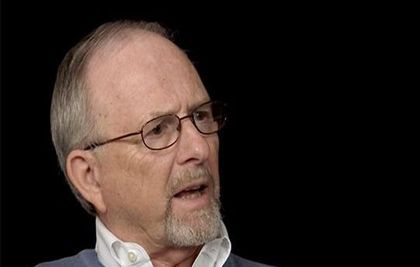“The isolation of the digital world and the lack of communication skills that we are witnessing, make sharing the gospel quite difficult”, Bruce Little, President of Forum for Christian Thought, says.
 Photo: Nik MacMillan (Unsplash CC)
Photo: Nik MacMillan (Unsplash CC)
Secularism is growing worldwide. Most people in Western societies either reject the God of the Bible or hold to a contrary worldview.
As Christians, what can we do when people aren't interested in hearing the gospel, when they are either antagonistic or apathetic?
According to Bruce Little, President of Forum for Christian Thought, pre-evangelism is an important first step, because “you have to have someone who understands that there is a God, if you want them to understand about sin and the need of a Saviour”.
Little believes that “the isolation that the digital world brought about, and the lack of communication skills that we are witnessing, make sharing the gospel quite difficult for us”.
When we are sharing the gospel with others, we “must realize that they are not rejecting me, they are rejecting the message”, he said an interview recorded at the European Leadership Forum conference in Wisla, Poland.
“We must keep in mind that the power is in the message and not in the messenger”, he added.
It is important “to listen to questions with deep intentionality, focusing on what people are asking me, and not just in answering the question”, Little pointed out.
“Behind the question is something that all humanity is looking for, whether be the desire for meaning, the belonging, etc”, and “if we understand that, we can do what Jesus did in John 4 or Luke 18”, turning a question from an unbeliever into a point for conversation.
Read the full interview below.
 Bruce Little, President of Forum for Christian Thought. / FOCL.
Bruce Little, President of Forum for Christian Thought. / FOCL.Question. Why is pre-evangelism an important step in communicating the gospel?
Answer. Pre-evangelism is an idea that was first set forth, at least in an overt way, by Francis Schaeffer as well as C.S. Lewis, so we are thinking about the days when they were writing.
Schaeffer died in 1984, and he is the one who made this idea of pre-evangelism, when he was dealing with the existentialists in the 60. And we have Lewis dealing with atheism in his time.
Why is pre-evangelism an important step?, I do not mean to say that it is a necessary step in every witnessing encounter, but I think that, more and more, it becomes an issue, because in the intellectual climate where we are are evangelizing. God is not even a possibility, He does not even appear on the radar, He has been discredited, He has been thrown out of the discussion.
We are dealing with people who are what we call Naturalists, people who deny there is anything above experience, so before we can start to talk about a God who sent His Son to be the Saviour of the world, we must be able to share with people to get them understand that there is a God, who has a Son, who loves the world and can send His Son to be the Saviour of the world.
Maybe it is not necessary in every occasion we encounter a human being, bur increasingly, as Naturalism begins to spread across the Western intellectual world, we need to be able to help people to start thinking in a worldview way that includes the idea of God.
That is what pre-evangelism does, because you have to have someone who understands that there is a God, if you want them to understand about sin and the need of a Saviour.
Q. What are some current cultural reasons that people reject the gospel in the West?
A. The gospel is being ejected in the West for a number a reasons, probably more than I can mention.
One, of course is what we might call the theological reason, and that is the scandal of the cross, the fact than man is a sinner who loves darkness better than light.
We must not forget that. When anybody speaks to another person about Christ, that is something we have to recognize.
Having said that, there are also culture issues. One of the issues of our day, which is maybe a condition more than an issue, has been created by the digital world.
The world of social media is not necessarily a negative thing, and I do not think that it is totally negative, but it has made it difficult for us to communicate the gospel of Christ.
There are so many books on this today, but the reason that stands out is what Sherry Turkle talks about in her book Reclaiming Conversation: the digital aid, in particular social media, has isolated humanity.
We have lost even our ability to communicate well, therefore, conversation is difficult.
We are sharing a historic message that is logical, if I could say so, because it is a progression of thought: men fall, men are sinners, men need a redeemer, Christ is the redeemer. There is a logical flow to this message, but if people have lost the ability to follow a logical conversation, that makes it very difficult for us to share Christ.
There are so many studies that show that, for example, our vocabulary is being limited, we are doing tweets and we only have 280 characters to do it. All that make the communication process difficult.
The things that are happening in our culture, the isolation that that brought about, and the lack of communication skills that we are witnessing, make sharing the gospel quite difficult for us.
Q. Why is it important to keep a big-picture view in mind when communicating the gospel?
A. When we are communicating the gospel of Christ, it is important to keep in mind the big-picture, the fact that all of us are situated in a larger context, the context of reality, where we all must live in, we do not choose, we do not create our own reality.
We keep the big-picture and say: “How is this person thinking about this or that?”. That person has to live in this reality, so, when I am witnessing to them, and they say: “I believe this or that”, if I keep the big-picture in mind, what I get that person to do is to take their beliefs and measure them up against reality itself.
Now it is not their beliefs against mine beliefs, it is their beliefs that are up against reality.
Sooner or later, of course, I will have to share my beliefs, but it helps to reduce the initial hostility they might develop.
We do not bend reality to fit our beliefs, our beliefs must bend to fit reality. Lewis said basically the same thing when he said: “Reality will never deceive you, you deceive yourself, but reality will not”.
Take a few steps down the path, and reality will tell you quite soon whether you are in the right path or you are not.
I think it is important for us to keep those ideas in mind, that is what I mean by the big picture as we are witnessing.
Q. What are some things to keep in mind when communicating with someone who rejects the gospel?
A. There are some things that we need to keep in mind when we are sharing the gospel with people, and they are rejecting what we have to say.
This may sound really simple, but I think it is the place where we have to begin: first, we must realize that they are not rejecting me, they are rejecting the message. That leads us to remember that the gospel is still the power of God and the salvation to everyone who believes.
We must keep in mind that the power is in the message and not in the messenger.
Second thing we should keep in mind is the fact that the power of the Spirit of God works upon the life of an individual, even after I have maybe disappeared.
If I am wise, if I am clever, and I say clever in the best sense of the word, in sharing the message, even if that person may reject it, if they reject it, they have heard it, because they cannot reject something they have not heard. So I can walk away believing that the Spirit of God can still use the Word of God.
Q. How do we turn a question from an unbeliever into a point for conversation?
A. When we engage with an unbeliever, we have the notion that often people come to us and raise the question. We can think in Luke 18:18, when the rich ruler comes to Jesus and he says: what must I do to be saved? .
That is a question, but notice how Jesus turns it around and allows that man to live with that. He says: would you want something to do?, I am going to give you something to do: keep the commandments.
He says: I have done that, and Jesus says: then, here is another thing for you to do, sell all you have and give your goods to the poor, and he goes away weeping.
Jesus turns around a question, because he understood what is behind the question, because he understands humanity.
We have to listen to questions with deep intentionality, focusing on what people are asking me, because I am looking for understanding in your question, and not just to answer your question.
I understand your question because I know something about humanity. Behind the question is something that all humanity is looking for, whether be the desire for meaning, the belonging, etc.
If we understand that, we can do what Jesus did in John 4, Luke, 18, you turn that question around, and you make it into a situation where the individual now has to leave with what is embedded in the question: what must I do to be saved?
What we would want to do, as good evangelicals, is to say: “No, you get it wrong here, you do not do anything for salvation”, that is our inclination, but that will now work well. We have to switch it around, we let them play by themselves, asking: do you want to something?, this is something you can do.
We know that in the example, the man goes away sorrowful. I do not think we should not let men go away sorrowful, without giving them gospel, the alternative: here is what you are really looking for, and it is found in Christ.
ABOUT BRUCE LITTLE
Bruce A. Little presently serves as Director of the Francis A. Schaeffer Collection for the Schaeffer Society of SEBTS.
He is also President of Forum for Christian Thought. Prior to teaching at Southeastern, he served as pastor of several churches over a 30 year period.
Little has master’s degrees in Apologetics and Religion and a PhD in Philosophy of Religion. He served as Senior Professor of Philosophy from 2001 to July 2018 at Southeastern Baptist Theological Seminary.
Since 1995, he has travelled widely in Europe and Asia, lecturing in universities, teaching in a variety of schools, and presenting papers at conferences. He has published in various professional journals, edited several books, either authored or co-authored six books, and contributed chapters in several books. He resides in Maine with his wife, Nancy.

Las opiniones vertidas por nuestros colaboradores se realizan a nivel personal, pudiendo coincidir o no con la postura de la dirección de Protestante Digital.
Si quieres comentar o